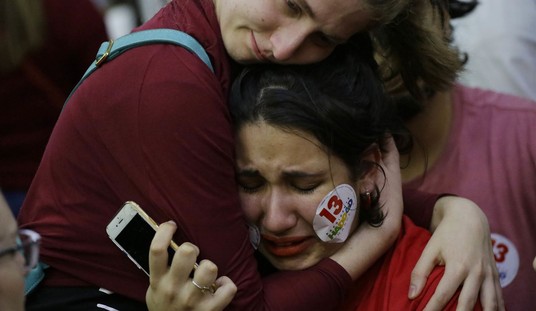On Tuesday, a federal court upheld the Washington, D.C. Metro’s ban on religious advertising, ruling that the Metro could refuse to run Christmas ads from the Catholic Archdiocese of Washington. The Washington Metropolitan Area Transit Authority (WMATA) is a government agency, and thus subject to the free speech guarantees under the First Amendment.
The church had sued, arguing that WMATA’s refusal to run the ads — which urged people to attend Catholic services to “find the perfect gift” — violated the First Amendment. The D.C. Circuit Court of Appeals ruled, however, that the metro could ban all religious speech, so long as it did not favor one religion over another. Catholic and religious freedom groups blasted the ruling.
“In siding with the D.C. Metro, the D.C. Circuit Court of Appeals rubber stamps discrimination against religious speech,” Ashley McGuire, senior fellow at The Catholic Association, said in a statement. “The Court’s claim that Metro ‘does not take sides’ regarding religious speech is laughable.”
“To the contrary Metro, which is funded and run by the federal government, has taken the side of restricting any and all religious speech, a clear violation of the First Amendment,” McGuire declared.
She stated the complaint clearly: “Tinder and Blue Apron can buy ads, but the Catholic Church cannot. It’s a textbook case of discrimination; it sends the clear message that secular speech is welcome in the public, but religious speech is offensive and should be barred.”
A free speech organization actually compared this discrimination against religious speech to America’s tragic history of racial segregation.
“The Supreme Court has never approved of a ‘separate but equal’ treatment of religious speech,” Hiram Sasser, general counsel for First Liberty Institute, told PJ Media. “This decision gives the government the ability to ban religious speech so long as all religions are banned. The First Amendment was established to protect varying religious opinions, not censor them.”
The church asked the court to find part of Metro’s ad policies, Guideline 12, was unconstitutional or violated federal law. The guideline bans advertisements that promote or oppose any religion, religious practice, or belief.
Judge Judith Rogers wrote the opinion of the court. She argued that the Catholic Archdiocese “has not shown that WMATA is impermissibly suppressing its viewpoint on an otherwise permitted subject.”
“Because Guideline 12 prohibits religious and anti-religious ads in clear, broad categories, bureaucrats are not called upon to decide whether the ad criticizing the Catholic Church’s position on condom usage, or the anti-Islam Muhammad ad, or the Find a Perfect Gift campaign ad is the more ‘offensive,’ or otherwise censor religious messages,” the judge wrote.
“WMATA’s subject based prohibition abides by the Supreme Court’s recognition that ‘[I]f there is any fixed star in our constitutional constellation, it is that no official, high or petty, can prescribe what shall be orthodox in politics, nationalism, religion, or other matters of opinion,'” Rogers argued.
The judge rejected a claim that a yoga studio ad WMATA accepted was religious. She also defended ads posted with a Christmas theme during the holiday season, so long as they were not religious.
“Ads promoting Christmastime sales are not expressing a view on Christmas any more than a McDonald’s ad expresses a view on the desirability of eating beef that demands the acceptance of a contrary ad from an animal rights group, or than a Smithsonian Air and Space Museum ad for a special stargazing event expresses a view on the provenance of the cosmos that demands a spiritual response,” Rogers wrote.
The court also upheld Metro’s acceptance of ads for the Salvation Army and a Christian radio station, suggesting that WMATA applied its policies well.
This case is one of a number of cases challenging WMATA’s advertising policies after other ads from PETA and Milo Yiannopoulos were denied.
Judge Brett Kavanaugh, President Donald Trump’s Supreme Court nominee, did not participate in the ruling, although he did participate in oral arguments. Kavanaugh seemed more inclined toward the Catholic Church’s position. Since other ads are allowed to promote charitable giving, offer times that stores are open, or push holiday sales, the Archdiocese argued that a ban on speech promoting religion is unconstitutional.
“This is just pure discrimination,” Kavanaugh agreed at the time, WTOP reported.
Interestingly, the case involved two former solicitors general. Former George W. Bush solicitor general Paul Clement represented the Catholic Archdiocese, while former Obama solicitor general Donald B. Verrilli represented WMATA.
If Kavanaugh is confirmed, and in the extremely unlikely event that the Supreme Court takes up the case, Clement and Verilli may be arguing before Kavanaugh once again.









Join the conversation as a VIP Member